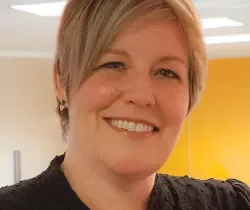Event marketing is on the rebound following a nearly complete shutdown during the pandemic and its aftermath of staffing shortages, resource gaps and budget cuts. The question for event marketing and operations leads is how to recover and grow revenue and attendee numbers with less. District Marketing and Bear Analytics recently hosted a webinar to discuss strategy and tactics for attendee acquisition gains. Here are some of our key tips and takeaways.
Read the Tea Leaves
Assessing the needs of the marketplace right now is both challenging and exciting. For the most part, the tenor and tempo of the event marketing cycle and strategy haven’t changed. And yet everything within a campaign, from budget to messaging to audience to conversions windows, may be different post-pandemic.
There are a lot of contradictions to work around and interpret. People inarguably missed live trade shows and events and virtual wasn’t a viable, long-term replacement for that. And yet our audiences are now used to virtual content and platforms, convenience and last-minute decision making and are considering budgets much more carefully.
Another example is that attendee behavior isn’t predictable right now, at least not based on event trend lines or historical data, and yet data is more critical than ever to hitting the right people with the right message when they’re ready to act and to make intelligent decisions on strategy and spend.
Follow the New Rules
There’s no silver bullet. A lot of event marketing today is making smart use of the “launch to live” cycle to try, test, measure and pivot. That said, here are three key strategies to keep in mind.
- Make sure you are, indeed, moving the needle. Set detailed KPIs and then measure, track and pivot. Don’t look at each channel as one steady flow of execution. Stop and possibly look at phases, layers to your audience, rolling communications, segmentation and targeting. A campaign can’t just roll like a wave from launch to show. People have changed, markets have changed, comfort has changed and needs have changed. In a lot of ways that’s an opportunity, but it requires consideration. If you’re typically a show that has reached 50% of reg by 10 weeks out, that may no longer be the case—and may not be for years to come. Lean into the behaviors you can count on, but also plan for some unpredictable behaviors, lagging stats and the need to move funds and efforts to performing channels.
- Rework your value messaging. Go right to the core of your event, your team, what you’ve always known to be true and reconsider it from an attendee/consumer perspective. A good old-fashioned SWOT or value proposition exercise may yield a lot of good intel on how to message your event’s value. ROI is often overused as a term in messaging, and yet it’s never been more important to show a tangible return on investment. You can back up messaging on the event value proposition with tools to help individuals justify attendance, promo codes and opportunities to save, contests for room nights and other incentives, but you have to revisit the messaging first. You can’t show value if you don’t know why today—right now—people should invest in attending, what you can deliver that’s new and what people expect from your event.
- Know where your industry is. It’s more than okay to speak to your industry as it stands and critical to show that as an industry-focused organization you understand their status, struggles and opportunities. How did your industry fare during the pandemic? Are they recovering and rebounding, was their business essential and never shut down, were they hit hard or did they thrive? All of these things are possible within different markets, and there are as many versions of mid-, post-, non-pandemic strategies and experiences as there are organizations and industries. You need to have a good sense of where your industry is in that cycle so that you don’t oversell safety to an audience that has moved beyond certain concerns, for example, or oversell optimism to an audience that’s still recovering. The most obvious considerations are healthcare and essential industries, but either way, remember that unity and recovery is a different message from resilience and facing a profitable future.
It’s an exciting time for events. We were missed and we’re back! Keep an eye on the big picture, and we’ll be back with another blog to talk about tactics and details soon.
Don’t miss any event-related news: Sign up for our weekly e-newsletter HERE, listen to our latest podcast HERE and engage with us on Twitter, Facebook, LinkedIn and Instagram!



Add new comment